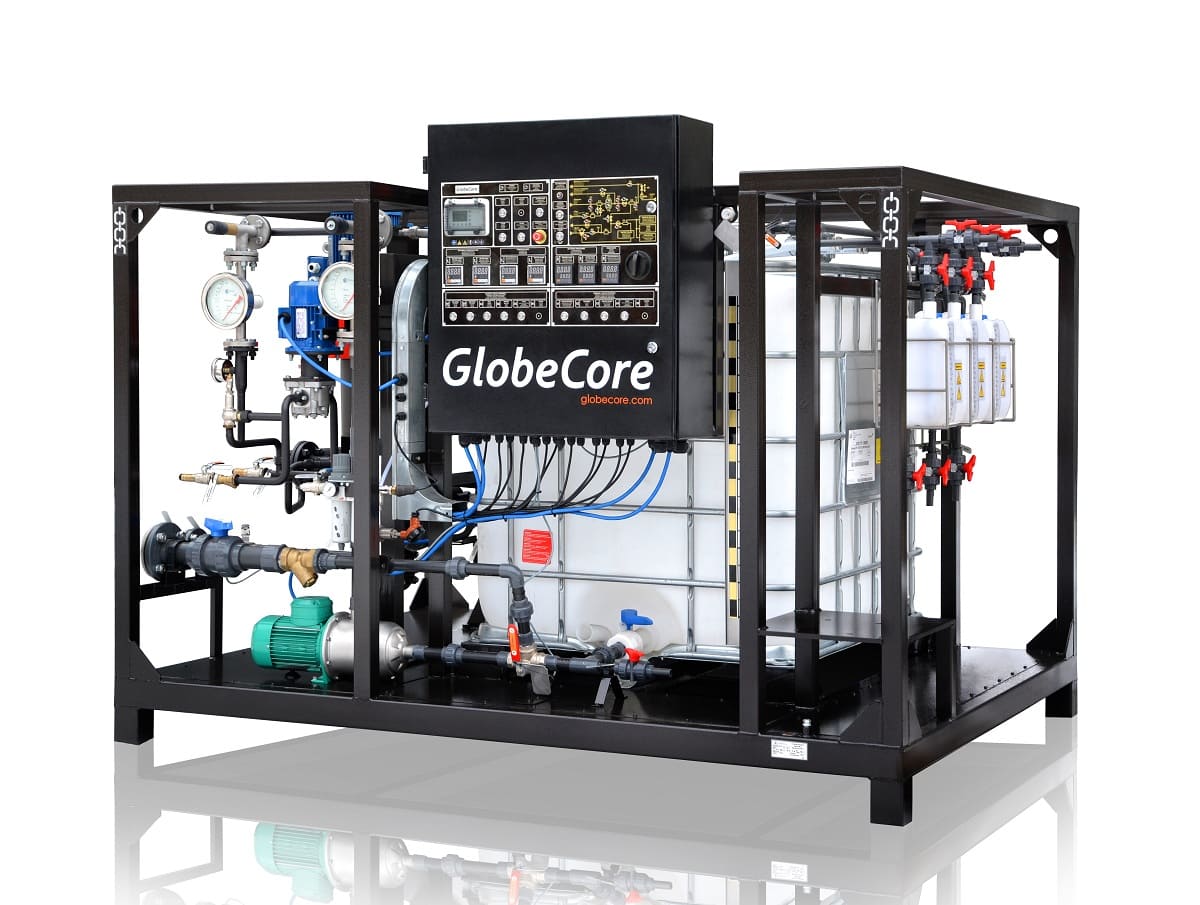The UVB-1 2m3/hour bitumen emulsion plant makes cationic and anionic bitumen emulsions. The emulsion can be used for the following purposes:
- tack coating before application of asphalt-concrete
- production of cold asphalt concrete mixes
- surface treatment of roads
- thin protective film
- patch repairs of roads
- water proofing of buildings and structures
- construction of soft roofs
- production of liquid rubber spray
UVB-1 (2 m3/hour) can be used by asphalt concrete mix production facilities. The plant can be installed and operated either indoors or outdoors. The unit operates in ambient temperatures between +5°C and +40°C. UVB-1 2m3/hour plants are made for production of cationic and anionic emulsions for road surfaces as well as liquid rubbers, part of roofing spray emulsions. This production capacities is ideal for moderately sized facilities with daily emulsion requirement of 12-16 ton/day. Bitumen emulsion first came into use in Europe in the 1930s. With time, the process has been improved by innovations, which improved efficiency, quality and technology. Today bitumen emulsions are a promising material used in road and civil construction, and emulsion production is growing. This is because the bitumen emulsions allow to increase profitability and reliability of construction works. GlobeCore’s plants fully comply with industry standards or exceed their requirements. At the same time, the equipment comes with an affordable prices tag, due to the use of innovative technologies. The plants are very reliable, make high quality product and can be controlled in either semi automatic or automatic mode. The high quality of the product is due to combination of hydrodynamic mixer and colloid mill. These components of the bitumen emulsion plant allow production of finely dispersed emulsion, fully compliant with the world’s quality standards and regulations. The units utilize precise portioning of water phase and blend. Equipment is customizable. Component depositories and worldwide product support allows to all but eliminate downtime. Bitumen emulsion, general information and principles The main component of any such system is the binding. In normal conditions, bitumen is solid, therefore to mix it with mineral material, it must be made liquid by heating. Emulsification of bitumen. Emulsifiers are additives making the emulsions stable. In the form of small particles bitumen is suspended in water. The amount of solid material in emulsion is up to 70%. Since viscosity of the emulsion coincides with the viscosity of water phase, it is liquid at room temperature. Emulsifier polarity. The molecule of the emulsifier is bipolar. The “tail” of the molecule solves in the bitumen particles, while the “head” pushed away other emulsifier molecules and does not allow bitumen particles to coalesce, stabilizing the emulsion. This is why the particles remain suspended in water. When emulsion contacts mineral material, the system balance is disrupted because emulsifier leaves the surface of bitumen droplets and the destabilized emulsion envelops gravel. The difference of charges between the grave and the emulsifier pushes out the water which then evaporates Road bitumen emulsion is a binding material forming a film, which is used in construction and repair of automobile roads, streets, bridges, overpasses etc. Processes which require the product to be poured on a surface mostly utilize fast setting emulsions. These emulsions can be used in all moderate to warm climates in Europe and Asia.
- High quality of construction work is possible without heating of mineral material and binding. Hence the energy savings of over 40% compared to the traditional “hot” process.
Environmental aspect. Bitumen emulsion do not emit hazardous substances into the atmosphere from solvents and bitumen. There is no risk of fire or explosion during processing or transportation of the material. Handing of emulsion. Bitumen emulsion is transported in specialized tanks, bitumen carriers, cubic tanks or metal barrels. Bitumen emulsion storage. Emulsion is stored in special tanks or other specifically equipped cylindrical vessels. Such vessels must be clean, with no old emulsion residue, bitumen, POL or other materials. Emulsion of different composition must never be stored in the same tank. To prevent contamination of emulsion and water evaporation, the vessel must be tightly closed. Storage temperature must be above 5°С. If storage volume is more than 1 m3, the tank should be equipped with additional stirring devices. GlobeCore manufactures specialized vertical bitumen tanks SBE and SMB for storage of bitumen emulsion and polymer modified bitumen respectively. They are equipped with circulation and heating systems and can be retrofitted into existing process of a facility.

